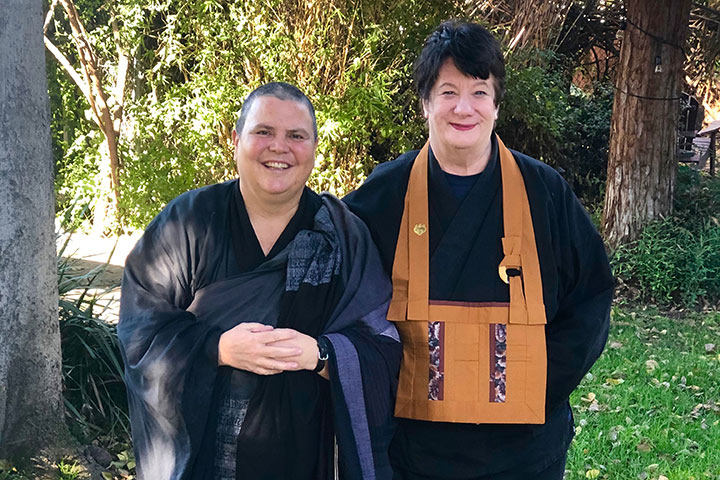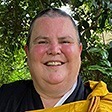
Radical Zazen
October 1, 2021
 by Darla Baiko Myoho Fjeld
by Darla Baiko Myoho Fjeld
Attention! Razan asked Ganto, “How about when arising and vanishing are ceaseless?” Ganto scolded and said, “Who is this arising and vanishing?”
– Case 43 Razan’s Arising and Vanishing from the Book of Equanimity.
Over the last year and a half this question of “Who is this arising and vanishing?” keeps arising in me and not vanishing. This question has been helpful to me as I have been dealing with the confluence of my Zen practice with wanting to be part of changing things in the world I live in, that is filled with racism and all the other “isms” and divisions and phobias and violence and anger.
Zazen is a radical practice that has caused a shift in me as to how I approach intentional change, including social change—it has shifted me into a new kind of paradigm for change that is different from the one I lived in during my many years of activism.
I use the word “radical” as an adjective for Zazen. The word “radical” was first used as an adjective in the 14th century—its meaning from the Latin is “root.” When I say that Zazen is a radical practice—I mean that it quite literally takes us to the root of Reality—the energetic Source of everything that is. There are lots of words for this root. I often use Oneness. The more we practice Zazen the more we experience this lively undercurrent of Reality—this Oneness. When we come from a place of radical Oneness, it changes the way we view the world—for this is a Oneness that does not diminish our unique differences.
The Samadhi that we enter into with Zazen takes us into a non-dual awareness that contrasts with our self-centered awareness in our ordinary lives. Compare how much time you spend being self-centered with how much time you spend in Oneness. Stop and remember that suffering, war, violence, prejudice, bigotry all emerge out of the self-centered side of living life. And self-centered people become us-centered people who construct us/them scenarios all over the place. When we forget that the realm of Oneness is at the heart of the realm of unique differences, we set up the dualistic hierarchies that yield hatred and bigotry.
The question “Who is this arising and vanishing?” takes us right into these two sides of living our lives: the Radiant Source where no dualisms exist, and on the other side, the world of arising and vanishing where we live our ordinary lives and try not to be deluded by our imaginary egos.
So why don’t we just practice Zazen on our cushions all the time sitting in the comfort of Oneness—especially when it makes us feel such blissful peace. Why do we have families and jobs and friends? Why do we take to the streets chanting “Black Lives Matter!”? Why do we vote? Why do we interact with other people? Why are those of us who are white facing our whiteness? Why are those of us who are oppressed for not being white working so hard to get out from under those who oppress us?
Well, here’s the thing—life is for living—there’s both a box and its lid—one without the other doesn’t make sense. A fetus doesn’t spend its whole life in the womb. At the right time, it emerges as a baby, then grows into a person and then vanishes. This is the rhythm of everything in the whole universe.
If we were to use Zazen as a means to get out of life, we would be like drug addicts just trying to chase some momentary bliss. It would be a way to numb ourselves from painful aspects of life and would still be based in Ego. Zen is not the opium of the people, as Karl Marx would have said. It is not about hiding from the world of samsara. It’s about the seamless interconnection between the world of Oneness and the World of Suffering.
Paradigm is another word that I use that I want to define. It points to a pattern of thinking or the worldview out of which we think about something. I am suggesting that engaging in radical Zazen opens up a paradigm for social change newer than the ones that have been used before.
In a lot of the work I have done over the years in politics and social change around poverty, women’s rights, gay and lesbian rights, economic justice, and racial justice—we used battle language and said things like “We’re fighting for better conditions” and “We lost the battle for the ERA.” I remember writing grant proposals for a poor people’s organization that I directed and struggling to come up with language that wasn’t saturated with war and battle metaphors that come from a dualistic way of thinking, where one side is the victim and the other the enemy. I’ve also been part of strategy discussions where I’ve been witness to people mostly on the same side shouting at each other and sometimes literally coming to blows over disagreements.
When we were all reading and talking about the Lotus Sutra, we heard a lot about Skillful Means (Upaya), which is a Buddhist’s ability to tailor our message to a specific audience. The Buddha spoke differently to his kind and wise stepmother Mahapajapati than he did to Angulimala, a serial killer. This skill is something that we all can develop in ourselves as we continue to practice Zazen. To develop this in ourselves, we must come to an experience of Oneness, and we must also be able to live in the world of Samsara where each living being is unique according to their own conditioning.
Each and every one of us is newly unique in each moment of our lives according to the influences, we have received which come from every direction—environment, other people, input from art, media, television shows, movies, reading material. Think for a moment about everything that has gone into making you, you. Well, that same thing is going on with everyone else. Everyone is doing the best they can according to the conditioning, the input they have received. Everyone, whether they are part of BLM or KKK, came to be who they are through their own unique conglomeration of conditioning.
And what changes conditioning? The answer is quite simple and obvious—more conditioning, and we’re all part of that. You never know, you might just be part of the antidote needed to cure the poisons of Greed, Anger and Ignorance. We can’t figure it all out because it’s too big, but we can see small Karmic Frames, such as how the murders of George Floyd and Breanna Taylor were the straws that ignited a call to a changed consciousness across this nation, and millions of people took peaceful protest to the streets.
And we can’t just forget about the people whose conditioning has led them to greed, hatred and ignorance. These poisons have filled the hearts of people throughout human history. Just as each of us is working on the precepts and finding more and more love in our hearts, this is possible for even the meanest, gun-toting racist you can think of. That person has come to be who they are in the same way you have come to be who you are, and in the next moment each of us will be a new person. Each of us is continuously arising and vanishing.
All of this, to me, suggests a different way of approaching social change, one that is not based on the very divisions of injustice, hatred, and violence that we are longing to end. It’s an approach based on the Precepts, such as Precept #7.
I will speak what I perceive to be the truth without guilt or blame. This is the practice of Not Elevating Myself and Blaming Others. I will refrain from elevating myself and blaming others and from encouraging others to do so. I will give my best effort and accept the results.
What if we apply Precept #7 to overcoming oppression? For instance, what if we apply this precept to our work to end racism? What would this look like if we centered ourselves in refraining from elevating ourselves and blaming others? What if I as a white person practiced not elevating myself as a white person and not blaming BIPOC people or immigrants for not getting a job I want or living in a better house? What if I practice Not Knowing and Bearing Witness when I am with a BIPOC person and allow what I hear to become part of my conditioning? What if I encourage other white people to do the same? What if I do my best to examine how I benefit from racism and give my best effort to not participate in the systemic racism that is part of the world I live in? And what if I do this and accept the results?
We often talk about “issues” or “subjects” or “concepts”—and this has its place and can be helpful sometimes. It’s important though, to remember that at the heart of every issue, there are living beings conditioned to be who or what they are moment by moment. There are real people who have endured the horrors of racism and other forms of oppression and real people who have inflicted these horrors. In the midst of all of this we vow: Numberless beings whatever their condition, I vow to serve them.
Sensei Myoho is a priest, the ZCLA Temple Development Steward, and is on the Teachers Circle and Board of Directors.
